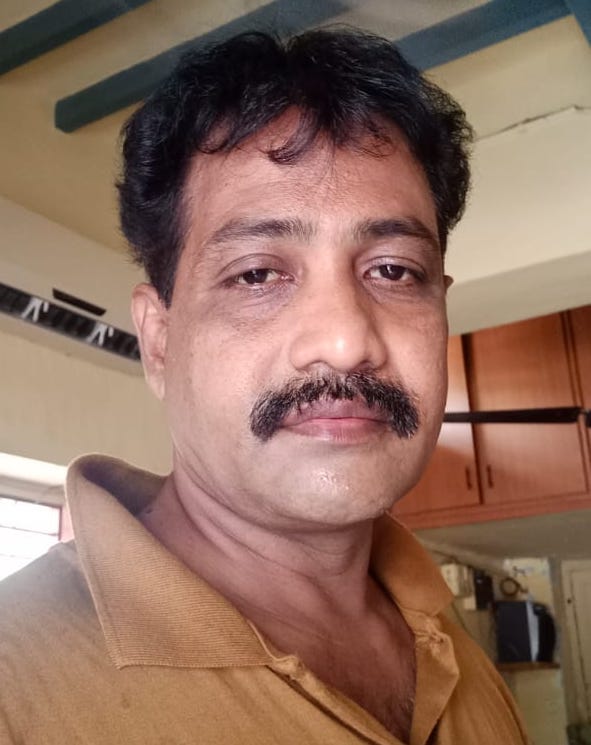
A Bazaar Scene
french peta square, Machilipatnam
The first tuk tuk un-tucks the village women,
arranging the cane baskets of
fresh vegetables along the pavement, the
farm-fresh colours smile,
like the prisoners being released but,
only draw the cow,
the same trespasser again they whisk
off she humbly moves to the
just arrived Huassain’s pushcart of bananas
for consolation and gets one,
the squint-eyed Gopal watches
from his grocery, opposite,
while he makes pious gestures
at the wooden money box
for an auspicious start, when the newspaper,
the paper boy suddenly flings hits,
the headlines being “High Onion Prices”
which news the television
in Rajastan tea stall too blares.
It swarms with
the morning walkers and hawkers who
abuse each other in a lighter vein
over sips and cigarette puffs. As some are
too inhibited to complain, grumble and
quit for the nearby Hanuman temple,
being drawn towards the
broken bits of chalisa, emanating from
those long-defective speakers
the endowments department
never bothers about
nor about those beggars who
diligently form
a cross legged line at the temple gates
for the day’s certain alms
from the more diligent devotees
with their firm faith
in salvation through good deeds
unlike the ogling nature
of the priest at the sanctum sanctorum.
Inside the fly-swarming,
shabby beanery beside,
his son hand-mixes
the rice batter while his beautiful daughter in law
sits at the cash counter,
and watches the butcher on the other side
calling the customers,
displaying the fresh, blood-dripping meat torsos,
pointing at their plump scrotum,
as most folk believe the male ones are tasty,
and a stray dog diligently stares
at his hand for his regular fling of bones
in the stagnate drainage canal beside
that adjoins the town’s police station
where a raped youth waits
another day for the justice that lies in the
inspector’s greasy palms
while the municipal worker collects the
garbage the town heaped
at the dilapidated Gandhi statue stained
by the bird droppings.
_____
A Covid Evening
A Letter from India
of weird silence
heavy without
footprints to walk
this into another sun
but the fickle sky’s
changing colors in
its drunken face
pretend searching
meanings, to flee our
anger hidden in our
startled eyes that peep
only from behind the
quarantined hope, I
trespass to touch this
twilight where our
clay Gods too pray,
fast as their customers
are fired, off now our
hypertense dreams search
for a future that waits in
some Nobel laureate’s
vaccinated idea but here
since the time’s lost in the
thistly grip of dragon’s claws
I dare hold it and stroll
ahead into the hidden
meanings – the hunger
of four mongrels unpack
over a lost calf that searches
its future in the dried up
garbage heap, its last pulse
charges at them as a
police whistle scatters
all the roads we quit are
stalked by the vulturous
eyeballs that wait to
hold our throats to suck
our voices into their
unfathomed silence, a
sudden shriek of a doctor’s
family breaks, down the church
street where the Eid Salah calls
for the answer that distances from
a son’s silence after his tears dry up
when the civic staff remove his
father’s death by an earth mover
moving the earth we see only on
the quarantined little screens.
_____
BIO
Sreekanth Kopuri is an Indian English poet from Machilipatnam, India. He was an alumni Writer in Residence, at Strange Days Books Greece. He recited his poetry and presented his research papers in many countries. His poems and research articles were widely published in journals like Heartland Review, Nebraska Writers Guild, Poetry Centre San Jose, Underground Writers Association, Word Fountain, A New Ulster, to mention a few. His book Poems of the Void was the finalist for the EYELANDS BOOKS AWARD. Kopuri is presently an independent research scholar in Contemporary Poetry, silence, and Holocaust poetry. He lives in his hometown Machilipatnam with his mother teaching and writing.

